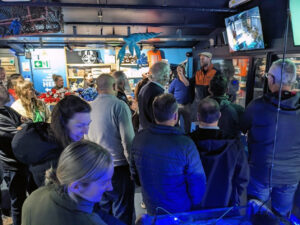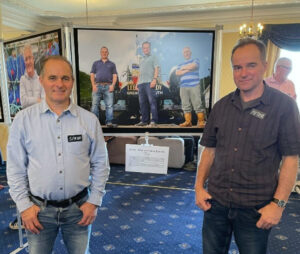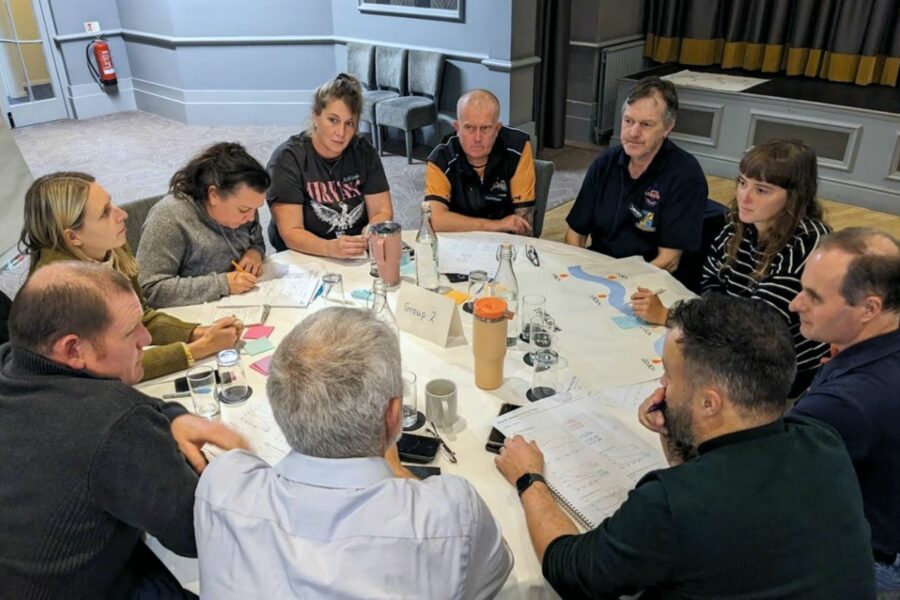The Securing Sustainable Inshore Fisheries – Northern Regions workshop took place in Whitby last week
Without fish there’s no fishery, but also without someone to catch the fish, there is no fishery.” This is a sentiment that is often aired in meetings with fishermen, as part of a growing awareness that the quality of life that commercial fishers and their families are able to achieve, or are being denied, is an important part of sustainable fisheries where people, as well as fish, can thrive.

It wasn’t all just talking! Participants were able to visit the Whitby Lobster Hatchery, where Joe Redfern talked about the community work that enabled the old fishmarket to be developed into a hatchery and visitor centre that will support the lobster fishery and educate the wider public about the industry’s efforts to ensure a sustainable fishery.
This week we ran, in Whitby, the second of our inshore and small-scale fisheries workshops, the first being in September in Poole (FN, 3 October, ‘The numbers are stark: workshop tackles U10 decline’). We were joined by 60 participants, 31 of whom were commercial inshore fishermen from northwest, northeast and eastern England.
As with Poole, the workshop had a clear focus – why are we losing so many boats from our inshore fleet, and what can feasibly be done about it? Data on the decline in the fleet, specifically in north and east England, were presented and then discussed by participants.
Whilst a lot of the focus was on the inshore and small-scale fishing fleet, recognising that the data shows a higher rate of decline in the under-10m fleet in many parts of the UK, discussions were often relevant to the fleet as a whole. Lack of recruitment into fishing, over-regulation, seal depredation and lack of freedom to diversify were just a few of the challenges that were raised.
Discussions were held in mixed tables, made up of at least four fishermen per table, who were sitting alongside staff from the regional IFCAs and AIFCA, the MMO, Defra, Blue Marine Foundation, the nearby Whitby Lobster Hatchery, academics and others. The point of this workshop was not to hear from just one group, but rather to bring different perspectives together to help build a common understanding of why we are losing so many boats and, importantly, establish areas of agreement about what can feasibly be done to address the loss.
Developing ideas that can improve the lives of fishing families and help make fishing livelihoods more viable requires considerable input from fishing families themselves. It is no good policy-makers or academics sitting behind desks coming up with things that don’t match the realities of peoples’ lives. The workshop provided a welcome space to discuss the challenges faced and think creatively, together, about what could feasibly be done to help.
The workshops were funded primarily by the Esmée Fairbairn Foundation and co-ordinated by a consortium of organisations spanning fisher organisations, NGOs, regulators and universities.

Cromer fishermen Simon and Peter Bywater were able to visit the Pride of the Seas: England exhibition in Whitby’s Royal Hotel, which highlighted the human face of the fishing industry. Their portrait, with their father David, is behind them.
Whilst the workshop funding enabled us to bring a good mix of voices into the room for a valuable three days of discussion, of course many voices were missing. The outputs from both the Poole and Whitby workshops, along with next steps and future plans, will be written up soon in a full report, that will be widely available and summarised for Fishing News, with fresh opportunities for others to comment and contribute.
This is the last of the two workshops that have run over the summer, which were pilots to see if there was value in the approach and test the appetite, amongst fishermen especially, for this style at event. We recognise the considerable fatigue expressed by many of being asked to engage in ‘yet another workshop’, especially when so many important national consultations are also going on.
Both workshops have been a real success, with some great feedback on the value of in-person meetings and, whilst three days felt (and was) very luxurious, it was an important opportunity to just take a breath, in what are very busy lives for everyone, and reconnect with one another.
There was a clear desire to do more in terms of future events, and some great inputs about how we might move forward with the learning we’re gathering to help inform current fisheries policy, including the Fisheries Management Plans which have recently been opened to national consultation by Defra.
The photo exhibition ‘Pride in our Seas: England’ was also shown at the venue – the Royal Hotel in Whitby – which enabled many of the people who feature in those portraits to come and see the exhibition as a whole.
Highlights of the workshop included the incredible images created by Caroline Chapple, our illustrator, who skilfully managed to capture our debates in a series of compelling graphics, which helped us distil some important clarity amongst what is a very complex world. Another highlight was an evening trip to the fantastic Whitby Lobster Hatchery.
Feedback from workshop participants included:
• “All hands up for an annual inshore and small-scale fisheries conference.”
• “There is no ‘about us’ without us.”
• “It’s been great to meet this diverse fishing community. I have learned so much – very worthwhile.”
• “This is the first opportunity for fishermen to be heard, not just spoken to.”
• “It’s a first to have a fisheries event where 50% of the people in the room were fishers.”
• “It has been so valuable to have so many fishermen here – it has been nice to be outnumbered.”
This story was taken from the latest issue of Fishing News. For more up-to-date and in-depth reports on the UK and Irish commercial fishing sector, subscribe to Fishing News here or buy the latest single issue for just £3.50 here.
Sign up to Fishing News’ FREE e-newsletter here.








